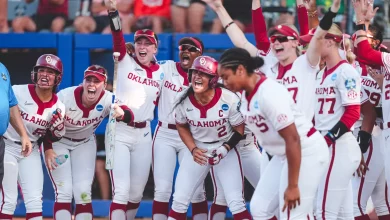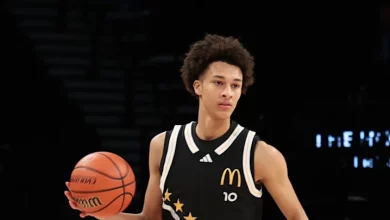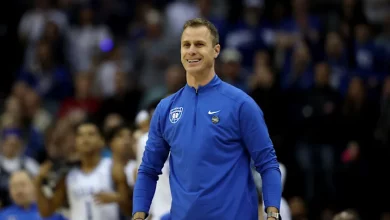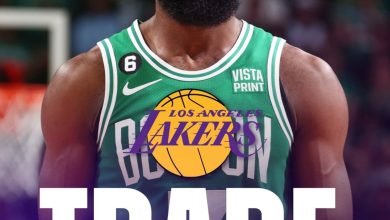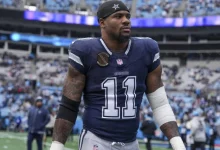Kahlil Whitney on his time at Kentucky: “I probably just needed a hug”
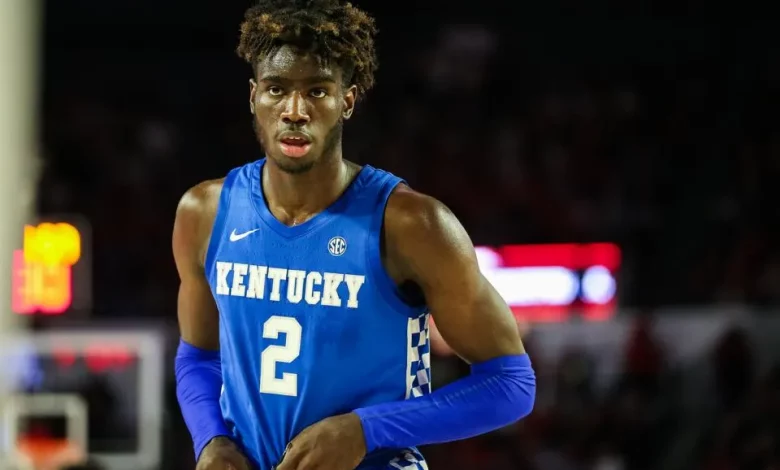
College basketball is a world of high expectations, fierce competition, and immense pressure. For many young athletes, the journey is about more than just stats and highlights; it’s a profound personal experience filled with challenges that test not only their physical skills but their mental and emotional resilience.
Kahlil Whitney’s time at the University of Kentucky encapsulates that reality. As a highly touted recruit, Whitney entered the program amid great anticipation, yet his path was marked by ups and downs, moments of self-doubt, and ultimately, personal growth. His poignant reflection — “I probably just needed a hug” — offers a rare glimpse into the emotional landscape behind the spotlight.
This candid admission invites us to look beyond the box score and understand the human side of an athlete’s journey at a program as storied and demanding as Kentucky basketball.
Kahlil Whitney arrived at Kentucky in 2018 as one of the nation’s top high school prospects. His combination of athleticism, scoring ability, and versatility excited Wildcats fans and coaches alike. The expectations were clear: Whitney was expected to contribute immediately and develop into a cornerstone player.
Coming from a strong high school career, Whitney’s commitment to Kentucky symbolized a new chapter. The program’s tradition of producing NBA talent and competing for national championships made it an ideal place for a young star to shine.
Yet, as Whitney would come to realize, the transition to college basketball, particularly at a place like Kentucky, would present challenges beyond the physical.
Kentucky’s basketball program is famous for its intense environment. Every game is under a microscope, every practice pushes the limits, and every player’s growth is scrutinized by fans, media, and coaches.
For Whitney, this environment brought both opportunities and pressures. Adjusting to new routines, heightened competition, and the weight of expectations was not always easy.
In interviews, Whitney has spoken openly about feeling isolated at times, struggling to find his footing, and grappling with the demands on and off the court.
“I was surrounded by a lot of people, but I didn’t always feel supported the way I needed,” Whitney said. “Sometimes, it wasn’t about basketball — I probably just needed a hug, someone to let me know it was okay to feel overwhelmed.”
Whitney’s candid remark highlights an important conversation in college sports today: the mental and emotional well-being of student-athletes.
Pressure at Kentucky isn’t just about performance; it’s about living up to the legacy, dealing with media scrutiny, and balancing academics and personal life.
For many athletes, especially young ones far from home, these pressures can be overwhelming. Whitney’s admission sheds light on the loneliness that can accompany the pursuit of athletic dreams.
Experts agree that emotional support is crucial. Whitney’s reflection reminds us that beneath the physical toughness lies a vulnerable human being in need of understanding and compassion.
Despite these challenges, Whitney’s time at Kentucky was not defined solely by struggle. He demonstrated flashes of brilliance on the court, showing glimpses of the potential that made him a top recruit.
Whitney’s perseverance, even when faced with adversity, speaks volumes about his character.
In one notable game, his athleticism and scoring ability electrified fans and gave a glimpse of what might have been. Yet consistency remained elusive, a common hurdle for young players adjusting to college-level play.
His journey underscores that development is rarely linear. There are highs and lows, setbacks and breakthroughs.
At Kentucky, the coaching staff plays a pivotal role in player development, not just athletically but personally.
Whitney has acknowledged the efforts of his coaches and teammates, noting that while the environment was intense, there were people who cared and tried to help him navigate challenges.
However, his reflection about needing a hug suggests that emotional support sometimes fell short, an area many programs continue to work on.
His experience highlights the importance of fostering environments where players feel safe to express vulnerability and seek help without stigma.
After his season at Kentucky, Whitney made the decision to transfer to a different program to continue his development and seek a fresh start.
This choice was met with mixed reactions, but for Whitney, it represented a chance to prioritize his growth — on his terms.
The move underscored his maturity and self-awareness, acknowledging that sometimes, the best path forward involves change and new beginnings.
Whitney’s journey is a reminder that success is not defined by staying on one path but by making choices that foster well-being and progress.
Today, Kahlil Whitney uses his platform to encourage young athletes to prioritize their mental health and seek support when needed.
His honesty about feeling vulnerable serves as a powerful message in the often stoic world of sports.
“It’s okay to not be okay sometimes,” Whitney says. “As athletes, we have to be strong, but that doesn’t mean we can’t ask for help or show emotion.”
This message resonates with many who face similar struggles in silence.
Whitney’s story contributes to a larger movement within college athletics that advocates for mental health awareness and emotional support for student-athletes.
Programs across the country are increasingly recognizing the need for counseling services, mentorship programs, and open dialogues about mental well-being.
Whitney’s candid reflection helps destigmatize these conversations, making it easier for others to share their own experiences.
As Whitney continues his basketball career, he carries with him the lessons learned from his time at Kentucky.
His resilience, coupled with a renewed focus on personal growth, positions him well for future success both on and off the court.
Whitney’s journey is far from over, and his openness about his struggles adds depth to his story, making him not just a player but a role model for honesty and perseverance.
Kahlil Whitney’s reflection — “I probably just needed a hug” — encapsulates a universal truth about the human side of sports.
Behind every highlight reel and statistic is a young person navigating complex emotions, expectations, and challenges.
Whitney’s story reminds us to look beyond the surface and honor the full journey of athletes — their struggles, growth, and triumphs.
As conversations about mental health continue to gain momentum, Whitney’s voice stands out as a beacon of courage and compassion, inspiring athletes everywhere to embrace their humanity and seek the support they deserve.



